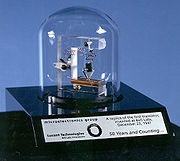- BY Admin
- POSTED IN Articles
- WITH 0 COMMENTS
- PERMALINK
- STANDARD POST TYPE

Transistor
A replica of the first working transistor.
In electronics, a transistor is a semiconductor device commonly used to amplify or switch electronic signals. Because the controlled output power can be much larger than the controlling input power, the transistor provides amplification of a signal. The transistor is the fundamental building block of all modern electronic devices, and is used in radio, telephone, computer, and other electronic systems. On November 17, 1947 John Bardeen and Walter Brattain, at AT&T Bell Labs, observed that when electrical contacts were applied to a crystal of germanium, the output power was larger than the input. The American physicist and Nobel Prize winner, William Shockley, saw the potential in this and worked over the next few months greatly expanding the knowledge of semiconductors in order to construct the first transistor. Shockley is considered by many to be the “father” of the transistor. Hence, in recognition of his work, the transistor is widely, yet not universally acknowledged as the most important invention of the entire 20th century since it forms today’s building blocks of processors found and used in almost every modern computing and electronics device.




